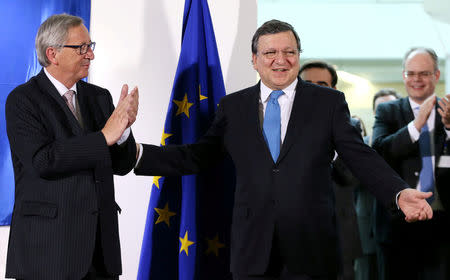After Barroso row, Juncker proposes tighter EU ethics rules
By Alastair Macdonald BRUSSELS (Reuters) - The European Commission has proposed lengthening the period of time its own former leaders must wait before taking up new jobs, following public uproar over its last president going to work for Goldman Sachs. Jean-Claude Juncker, president of the EU executive, said in a statement that he and his successors should have to wait three years after stepping down before being able to take up a new post without seeking special Commission approval. The existing code of conduct stipulates a "cooling off period" of 18 months. Commissioners other than the president - each nominated by an EU member state - would have to wait two years before being completely free to take other work. The issue came up when Juncker's predecessor Jose Manuel Barroso said just after Britain stunned the EU by voting to quit that he was joining U.S. investment bank Goldman Sachs to advise it on the Brexit process. The former Portuguese premier had not needed Commission approval as his term ended 20 months earlier. "In the light of recent experience made with members of the previous Commission, I feel that our Code of Conduct should be tightened in order to set the highest ethical standard possible for possible cases of conflict of interest," Juncker said. Last month, the Commission's ethics panel, comprised of former senior figures in EU institutions, cleared Barroso of breaking rules but said he did not show the "considerate judgement" one would expect from someone of his stature. Juncker had been among those critics who said the move to a U.S. bank, associated in the minds of many Europeans with the failings of the global financial system, risked fuelling a view that the EU was dominated by an out-of-touch elite in league with international business. Defenders of Barroso and Goldman said many critics were voicing unreasonable prejudice. Barroso has robustly defended his own actions. EU ethics supervisor, European Ombudsman Emily O'Reilly, welcomed Juncker's proposal but repeated her view that, for some Commission roles, the risk of being seen not to have acted with integrity taking up new jobs, could last for very much longer. In Parliament, asked by Juncker to review his proposals to change the code of conduct for commissioners, Greens transparency spokesman Benedek Javor said it would be better to give all commissioners a three-year cooling off period. "The Commission's response to recent scandals has been poor, slow and selective," Javor said. "There won't be real trust until ... there is a clear process for policing and sanctioning violations of the ethics rules, including with fines." Another member of the EU executive arm, Germany's Guenther Oettinger, came under fire recently over trips he made to Budapest on a private jet belonging to a German businessman close to the Kremlin. He was also forced to apologise for offending China, gay people and French-speaking Belgians this month. The Commission was on the defensive again recently when a former antitrust and digital commissioner Neelie Kroes was identified in leaked Bahamas documents as having a role in an offshore business which she had failed to declare to the EU. (@macdonaldrtr; Editing by Louise Ireland)

 Yahoo News
Yahoo News 


